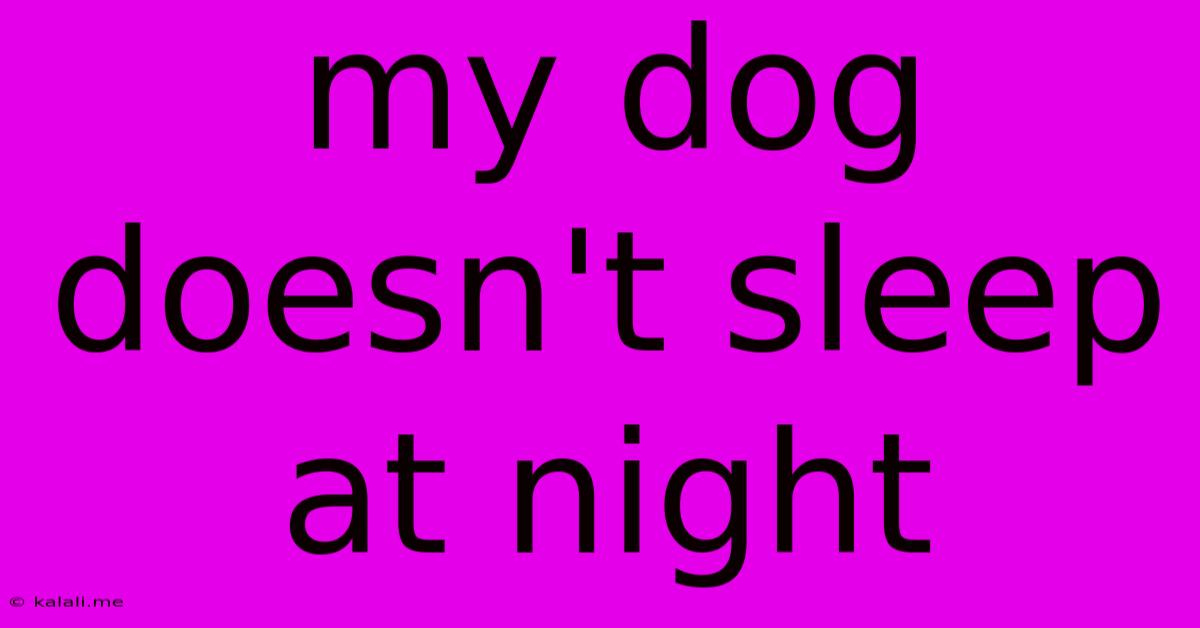My Dog Doesn't Sleep At Night
Kalali
Jun 02, 2025 · 3 min read

Table of Contents
My Dog Doesn't Sleep at Night: Troubleshooting Your Canine's Restless Nights
Is your furry friend keeping you up all night? A dog that doesn't sleep at night can be incredibly frustrating for both you and your pet. This article explores common reasons why your dog might be experiencing sleep disturbances and offers practical solutions to help both of you get a good night's rest. We'll cover everything from medical conditions to behavioral issues, empowering you to address the root cause and restore peaceful nights.
Understanding Your Dog's Sleep Patterns
Before we delve into the problems, it's important to understand that dogs, like humans, have individual sleep patterns. A puppy will naturally need more sleep than a senior dog. However, consistent nighttime restlessness could signal a problem. Consider these factors:
- Age: Puppies often wake frequently for feeding and potty breaks. Senior dogs may experience age-related sleep disorders, such as cognitive dysfunction.
- Breed: Certain breeds are naturally more energetic and require more exercise than others.
- Health: Underlying medical conditions can significantly disrupt sleep.
Common Reasons Why Your Dog Doesn't Sleep at Night
Several factors can contribute to a dog's inability to sleep soundly at night. These include:
-
Medical Conditions: Pain, arthritis, allergies, infections, hyperthyroidism, and other health issues can cause discomfort and prevent restful sleep. A veterinary checkup is crucial to rule out any underlying medical problems. This includes examining for conditions like hip dysplasia, which can cause significant nighttime pain.
-
Parasites: Fleas, ticks, and other parasites can cause intense itching and discomfort, leading to restless nights. Regular flea and tick prevention is vital.
-
Anxiety and Separation Anxiety: Dogs may exhibit anxiety-related behaviors like excessive barking, pacing, and destructive chewing when left alone at night. This is particularly common in dogs adopted from shelters or those who have experienced trauma.
-
Boredom and Lack of Exercise: A bored or understimulated dog may have excess energy at night, leading to restlessness and disruptive behaviors. Sufficient daily exercise, both physical and mental, is crucial for a well-rested dog. This includes activities like fetch, walks, and puzzle toys.
-
Dietary Issues: Indigestion, food sensitivities, or eating too close to bedtime can lead to discomfort and disrupted sleep. Consider feeding your dog earlier in the evening and switching to a higher-quality, easily digestible food.
-
Environmental Factors: Noise, temperature, light, or uncomfortable bedding can also affect a dog's ability to sleep. Ensure a quiet, dark, and comfortable sleeping environment for your dog.
Solutions for a Better Night's Sleep
Addressing your dog's sleep problems requires a multifaceted approach:
-
Veterinary Consultation: This is the most crucial step. Rule out any underlying medical conditions.
-
Establish a Consistent Routine: Regular feeding times, exercise schedules, and bedtime routines can help regulate your dog's circadian rhythm.
-
Sufficient Exercise: Tire your dog out physically and mentally throughout the day.
-
Enrichment and Mental Stimulation: Provide plenty of toys, puzzles, and opportunities for mental engagement.
-
Create a Relaxing Bedtime Routine: A calming bedtime routine might include a gentle massage, a quiet walk, or a calming treat.
-
Address Anxiety: Consider strategies like calming aids (always consult your vet), pheromone diffusers, or professional training to help manage anxiety. Consult a veterinarian or a certified dog trainer if you suspect separation anxiety.
-
Optimize Sleep Environment: Ensure a quiet, dark, and comfortable sleeping area.
By carefully considering the potential causes and implementing the appropriate strategies, you can help your dog sleep better at night and restore some peace and quiet to your home. Remember, patience and consistency are key to success. If problems persist, seeking professional help from a veterinarian or certified dog behaviorist is always recommended.
Latest Posts
Latest Posts
-
How To Check A Circuit Breaker With A Multimeter
Jun 04, 2025
-
Can You Hit An Object With Strength But Not Speed
Jun 04, 2025
-
A 2 B 2 A 2 B 2
Jun 04, 2025
-
Can You Be Evil If You Follow Kants Principals
Jun 04, 2025
-
Why Is There No Roast Beef In Store
Jun 04, 2025
Related Post
Thank you for visiting our website which covers about My Dog Doesn't Sleep At Night . We hope the information provided has been useful to you. Feel free to contact us if you have any questions or need further assistance. See you next time and don't miss to bookmark.